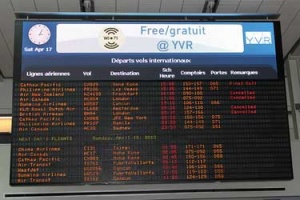WTO calls for solidarity, as airlines question ban

The World Tourism Organisation (WTO) has called for solidarity among the global tourism industry as the volcanic ash crisis enters its sixth day.
The plume of volcanic ash drifting across Europe - following the eruption of Eyjafjalla in Iceland - has seen the closure of major parts of European airspace since Thursday 15th April.
As many as 100,000 flights have been cancelled as a result, according to Eurocontrol, the European Organisation for Safety of Air Navigation. The IATA has also suggested the crisis is costing airlines as much as $200 million each day.
In response the WTO called on the industry to minimise the impact on international travellers.
A statement read: “Millions of people inside and outside Europe have been affected by the current disruption of air traffic.
“The most important issue is that travellers are unable to move – to leave or return – and that airlines, hotels and tour operators as well as local tourism authorities and diplomatic representations are facing extreme pressures to respond in the most adequate way possible to safeguard the rights and well being of travellers.”
The present air traffic disruption is expected to have a significant economic impact on Europe, warned the WTO, with serve disruption expected among the 700,000 travellers usually expected to arrive on the continent each day.
Discipline
However, calls for solidarity have gone unheeded in some quarters, as airlines begin to question the need for a blanket ban on aviation traffic.
“We are far enough into this crisis to express our dissatisfaction on how governments have managed it - with no risk assessment, no consultation, no coordination, and no leadership,” said IATA director general Giovanni Bisignani.
ADVERTISEMENT
The IATA also criticised Europe’s unique methodology of closing airspace based on theoretical modelling of the ash cloud.
“This means governments have not taken their responsibility to make clear decisions based on facts. Instead, it has been the air navigation service providers who announced they would not provide service,” added Mr Bisignani.
British Airways has also questioned the need for a ban on aviation travel, following a test flight through the ash cloud.
Analysis of the Boeing 747 following the flight revealed “no variations in the aircraft’s normal operational performance”, explained BA.
Following the flight British Airways’ chief executive Willie Walsh said: “We believe airlines are best positioned to assess all available information and determine what, if any, risk exists to aircraft, crew and passengers.
“Since airspace was closed on Thursday our assessment is that the risk has been minimal and can be managed by alternative procedures to maintain the highest safest standards.
“We call on the government urgently to adopt new policies that would allow us to resume flying.”
Bailout
No-frills carrier easyJet has joined a chorus of airlines in calling for government support to alleviate the financial stresses placed on the aviation sector following the crisis.
“This is a major natural disaster which has had a huge impact, affecting over one million passengers on UK airlines alone, with the financial cost to airlines running to hundreds of millions of pounds,” said easyJet chief executive Andy Harrison.
Airline representatives have pointed to the precedent set by government support following the fall in demand for air travel following the 9/11 terrorist attacks in New York.
“When the forces of nature act on this scale, only the government has the resources to respond.
“The government is responsible for caring for its citizens following a natural disaster and therefore it should help the airlines get people home and cover the costs of care and repatriation,” concluded Mr Harrison.

